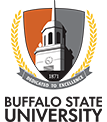Social Media Guidelines
Professionalism
Social media communications tools are to be used for official Buffalo State business, such as marketing to potential students; communicating with prospective and current students, alumni, and employees; educating the public about Buffalo State and its mission, programs, and events; and emergency communications. Personal views or beliefs or commercial messages have no place on institution-approved social media accounts.
Active Status
Institution-approved social media accounts should remain active all 12 months of the year, including during student breaks. Regular reviews of all institution-approved social media accounts will be conducted by the Marketing and Communications Office. If any institution-approved social media account is found to be consistently inactive, Marketing and Communications will contact the registered administrator(s) to deactivate the account. Departments or areas that can no longer support their accounts should close the appropriate institution-approved social media accounts and promptly notify Marketing and Communications at buffalostatecomms@buffalostate.edu.
Accessibility
Buffalo State is committed to providing all students, faculty, staff, and visitors with access to online resources. Institution-approved social media accounts must be accessible to users with disabilities, in compliance with SUNY policies and federal and state laws and regulations.
All institution-approved social media accounts must make certain that all resources are available in a format accessible to users with disabilities.
Varying accessibility options are available on social media platforms. University accounts must ensure that social media posts are accessible to the greatest extent possible.
Please refer to Maintaining Social Media Content for detailed guidelines on accessibility before posting.
Content Guidelines
- Information published on institution-approved social media accounts shall comply with all existing Buffalo State policies.
- Buffalo State site administrators will remove posts or comments from any institution-approved social media account if it:
- Includes profanity or is obscene (profanity filters employed where available).
- Constitutes a true threat or unlawful harassment.
- Violates laws or university rules or policies.
- Intentionally misleads, is factually erroneous, or libelous.
- Infringes on the confidentiality or privacy of any party.
- Sells, solicits, or advertises products/services that are not Buffalo State-affiliated.
- Is unrelated to the Buffalo State content or forum to which it is posted.
- Social media platforms are public spaces, and any discussion of confidential Buffalo State issues is prohibited.
- Personal information, such as cell phone numbers, addresses, Social Security numbers, or class schedules, may not be posted.
- Visitor posts or comments do not reflect the opinions or positions of Buffalo State.
- Content must adhere to all applicable state, federal, SUNY, and university laws and policies; faculty and staff handbooks and regulations; and policies and regulations such as those governed by FERPA, HIPAA, and NCAA. Any content or online activity created by a poster or site moderator that violates these ordinances or contains or leads to the release of a student’s private or personal information is strictly prohibited and must be removed.
- The university does not endorse or use any social network internet communication service or media-sharing service as a secure means of communication for online business transactions or matters involving personal information. The university will not ask for, nor should an individual provide, credit card or payment information, classified information, privileged information, private information, or information subject to nondisclosure agreements via any social network internet communication service.
- Buffalo State employees may not divulge any confidential information that they have access to as employees.
Moderator Guidelines
Page administrators and moderators must recognize that institutionally affiliated accounts and groups are considered public forums. Activity of moderators in these online forums can represent Buffalo State to a large audience. Make sure that your posts carry out the spirit of the university's mission, vision, and values. Be sensitive to topics that may be incendiary, or that may reflect poorly on the institution. Additionally, as moderators of these public forums, account administrators and moderators must provide an open, viewpoint neutral venue for exchange of all topically relevant opinions and should only remove content that violates the university's content guidelines.
If you have questions about how to handle a post, topic, or exchange, please contact buffalostatecomms@buffalostate.edu.
Additional Information
Emergency Situations
Campuswide Emergencies
During campuswide emergencies, all social media accounts associated with the university are asked to go “silent” and share only posts from official Buffalo State social media accounts relevant to public safety. This will help ensure that important emergency messages reach intended audiences as quickly as possible.
The following sites are considered official primary social media sites during emergency situations:
http://facebook.com/buffalostatecollege
http://facebook.com/buffalostateupd
X (formerly Twitter)
http://twitter.com/buffalostate
http://twitter.com/buffalostateupd
Reporting Information
See Something. Say Something.
It is impossible for the Marketing and Communications Office to monitor all social media activity taking place at or referencing the school. The university must rely on the community to help by proactively alerting it to issues of concern on social media. Such examples include threats to life, cyberbullying, self-harm, illegal activities, or other similar serious negative behaviors that could be prevented if responsible individuals were alerted. Such incidents should be reported immediately to University Police at (716) 878-6333.
Threats conveyed over social media have real legal consequences, even if made in jest or via “anonymous” applications. Threats made online, regardless of intention, are never taken lightly and should not be posted under any circumstances.
Users are encouraged not only to preserve their own safety but also to take actions to preserve the safety of their community. The universal concepts of civility and speaking up when witnessing harmful behaviors directed at others are equally applicable to social media.

